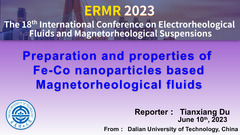Improving the shear yield strength and sedimentation stability of magnetorheological fluids (MR fluids) is always the focus of research. In previous research, introducing nanoparticles into the micron-particle system is a good strategy to improve both properties. However, the introduction of nanoparticles will lead to an increase in the zero-field viscosity, resulting in a reduced adjustable range and redispersibility of the MR fluids. A more reasonable solution strategy is to reduce the added amounts of nanoparticles by improving their magnetic properties. In this study, we prepared high properties Fe-Co nanoparticles, and studied the rheological properties and sedimentation stability of pure Fe-Co nanoparticles-based MR fluids, for the purpose of analyzing the feasibility as nanoparticles additives. Firstly, the Fe-Co nanoparticles were prepared by DC arc plasma method, and disposed by the low temperature annealing method to further reduce the coercivity. The prepared Fe-Co nanoparticles have 200-400 nm independent spherical structure and 400-800 nm chain structure composed of 30-80 nm spherical particles, high saturation magnetization (208 emu/g), low coercivity (58 Oe) and remanent magnetization (5.8 emu/g). And then, the MR fluids with a mass fraction of 20% were prepared using Fe-Co nanoparticles and silicone oil as dispersed phase and carrier liquid, respectively. The test results of the MCR 301 rotary rheometer show that the prepared MR fluids have a 4.61 kPa shear yield strength under a magnetic field of 436 kA/m, excellent time responsiveness and reversibility. The magnetorheological properties of MR fluids were fitted well by Bingham and power law model, and described by Seo-Seo and Casson fluid model. Meanwhile, the sedimentation ratio of the prepared MR fluids was still 87.3% after 72 h natural sedimentation, indicating an excellent sedimentation stability. In conclusion, this study provided a nanoparticle with excellent properties for introducing the micron-scale MR fluids systems.


Comment submit